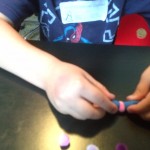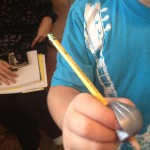Children who struggle with sensory processing disorder may struggle with processing senses information (smell, touch, movement, vision, taste and hearing). They may have difficulty responding appropriately to this information. Often, they possess one or more senses that either under or overreact to stimulation. The child’s behavior and development can be affected by this disorder. Sensory Integration Disorder […]
Author: Danielle Shulman
Tactile Defensiveness
Children who experience tactile defensiveness, a type of sensory processing disorder, are hypersensitive to touch sensations and are overwhelmed and fearful of everyday activities and experiences. Sensory defensiveness often prevents a child from interacting and playing that are both important to social and learning interactions. Because their tactile systems are giving out inaccurate information, children […]
Gravitational Insecurity
Gravitational insecurity is an extreme fear of everyday movement, having one’s feet off the ground, or being in an upright position. Children experiencing this fear have issues with gravity and they exhibit out-of-proportion reactions to situations that don’t pose any real danger. They prefer to stay low to the ground and you will usually find […]
How Children with Autism Benefit from OT (Occupational Therapy)
Autism is often characterized by difficult communicating and connecting with others, according to WebMD. Additionally, individuals with autism also show interested limited to specific activities and play. However, Autism Speaks also outlines a list of smaller symptoms which frequently present in individuals with autism, including trouble with how they take in information concerning tastes, textures, […]
Signs of Dyspraxia in Children
A person who suffers with dyspraxia experiences problems with coordination, movement, processing, memory, judgment and other cognitive skills. This condition affects the body’s nervous and immune systems. According to the National Center for Learning Disabilities, people who have dyspraxia have challenges with completing fine motor tasks and planning. These issues can range anywhere from simple […]
Finger Strengthening Toys
As an adult, you probably don’t give much thought to your fine motor skills, even though you use them on a regular basis. From writing to zippering your jacket and from tying your shoes to cutting your steak, you are constantly putting those tiny muscles in your hands to work. To you, it may seem […]
Developing Your Child’s Pre-Writing of Shapes
One of the most valuable things that you can do for your child is present opportunities to develop academic skills at a young age. By offering your child opportunities to engage in learning early on, you’ll set him or her up for academic success and instill a lifetime love of learning. Handwriting is a vital […]
How to Get Your Child Ready for Kindergarten
Kindergarten is a big step forward for a youngster. To get her ready, help her learn how to do basic activities so she fits in and can participate fully in classroom activities. Here are five activities you can have her practice so she is able to get the most out of kindergarten. 1. Teach her […]
Summer Crafts to Help Promote the Development of Fine Motor Skills
Arts and crafts are tailor-made for bored kids during the long days of summer. Not only do they get children out of mom’s hair for awhile, they also help them develop fine motor skills. Practicing the skills with these five crafts will help your child with everyday practical chores from buttoning his shirt to learning […]
Developmental Writing Skills and Milestones by Age
The physical ability to hold a pencil and write words develops slowly in a child. Advancing from scribbles to a bestseller takes time. Here is a look at the major milestones involved. At age 12 to 13 months many toddlers can hold a crayon and make marks on a sheet of paper. Early attempts at […]
Best Toys to Promote Fine Motor Skills in Children
Play is hard work! Toys and puzzles help your child develop fine motor skills. It might look like your giggling toddler is engaged in pointless, but enjoyable busyness. Actually, she’s hard at work with the business of developing physical, cognitive, and emotional skills appropriate for her age. Early pediatric development involves your child learning about […]
How Is Pediatric Occupational Therapy Helpful for Children Who Have Difficulty Paying Attention and Sitting Still to Focus
Pediatric occupational therapy has a wide range of methods to help children with focusing problems, whether it is due to Attention Deficit/Hyperactivity Disorder or another cause. Many of these kids have sensory processing challenges, which is what occupational therapy addresses. The Fidget Factor Children with ADHD often wiggle a lot and make lots of noise. […]
Classroom Signs that Your Child May Benefit from Pediatric Occupational Therapy
A little extra help from pediatric occupational therapy can help a child adapt and thrive in the classroom. Both you and his teacher can spot signs that indicate his/her challenges are more than a passing phase and could benefit from pediatric occupational therapist. Here is a look at five indicators that your child might be a […]
Sensory Integration Therapy for Children with Autism
Help for children with autism has been reported in a new study. Sensory integration therapy was shown to help the children reach daily goals and reduce the amount of outside assistance they needed. As practiced by occupational therapists, sensory integration therapy uses play, designed in ways to change how the brain responds to activities that […]
What is Dyspraxia?
Dyspraxia is a condition that can affect both children and adults, which can impact their fine and gross motor skills. In addition, they have trouble figuring out the correct order to handle the planning, organizing and carrying out of their movements. Many experts feel is it hereditary. It is often found along with reading, focus […]
What is the Vestibular System and How is it Considered One of the Main Senses in Regulating Sensory Integration
This sensory system plays an important role in muscle tone, motor control, stability, ability to correctly perceive things around them visually, balance, language skills that rely on the auditory system, and even with attention. However, little is discussed about a person’s vestibular system and how it plays a role in daily living. Basically, it […]








